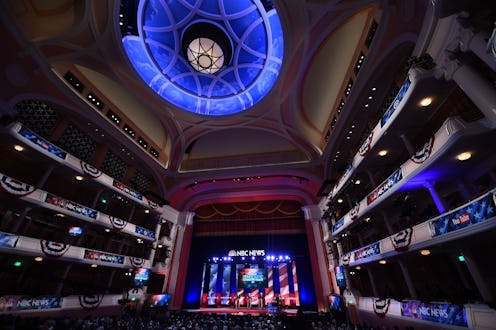News
The #1 Takeaway From Sunday's Dem Debate
It has been a busy weekend for the American people. Playoff football pushed the NFL one step closer to the Super Bowl, before viewers across the country shifted their focus toward politics. The fourth Democratic debate (the last before the Iowa caucuses) took place Sunday night at the Gaillard Center in Charleston, South Carolina. As in past debates, candidates took to the stage to discuss issues of foreign policy and economics. However, there was one key difference in Sunday night's showdown. The most important Democratic debate takeaway is the fact that race was so openly and frequently discussed. Frankly, it was a wonderful shift, and a much-needed one.
Scheduled the night before Martin Luther King, Jr. Day, all three candidates had the spirit of Dr. King in their hearts, as they referenced his vision during their opening remarks. The venue itself was especially poignant, given its location. Its hosts, the Congressional Black Caucus Institute, played an important factor in the trajectory of the debate as well. The debate took place just a block from Emanuel AME church, whose history includes a visit from King and, more recently, a tragic shooting that claimed nine lives.
The issues of gun violence and police brutality weighed heavily on the minds of those in attendance, as well as on moderators Lester Holt and Andrea Mitchell. Candidates were asked directly about Black Lives Matter, the fatal shooting of Walter Scott, and racial injustice as a whole. Clinton's response to the question of whether such incidents play "straight to the fears of many African American men that their lives are cheap" was incredibly powerful:
There needs to be a concerted effort to address the systemic racism in our criminal justice system ... One out of three African American men may well end up going to prison. That's the statistic. I want people hear to think what we would be doing if it was one out of three white men, and very often, the black men are arrested, convicted and incarcerated for offenses that do not lead to the same results for white men. So, we have a very serious problem that we can no longer ignore.
Host network NBC's partnership with YouTube would prove fruitful in furthering that dialogue. YouTube star Franchesca Ramsey asked a question about potential conflicts of interest in local law enforcement investigating cases of police brutality. In response, Sanders stated that the Justice Department should get involved in such incidents:
This is a responsibility for the U.S. Justice Department to get involved. Whenever anybody in this country is killed while in police custody, it should automatically trigger a U.S. attorney general's investigation.
Minority voter interest was also discussed. Holt cited Congressional Black Caucus chairman G.K. Butterfield's endorsement of Clinton, as well as her elevated support numbers among minority voters, as a potential worry for Sanders. He then questioned O'Malley's record as mayor of Baltimore, citing the death of Freddie Gray as a potential marker of the candidate's contributions to unrest in the city. The fact that Holt, an accomplished African American, was asking such important questions about race shows just how important representation is in addition to the issues themselves. For people of color all over the country and the American public in general, the Democratic debate's focus on race is not only the biggest takeaway, but also a hopeful sign for debates to come.
